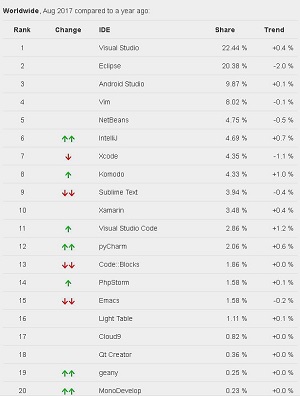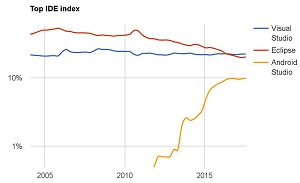News
Visual Studio Leads IDE Popularity List, IntelliJ Climbing Fast
Microsoft's Visual Studio now reigns supreme atop the IDE popularity list maintained by the PYPL Index, but the IntelliJ offering is showing signs of catching up with impressive growth. Visual Studio Code is also coming on strong.
While holding a steady market share over the past 12 years or so, Visual Studio has emerged atop the rankings following a slow decline by the open source Eclipse -- formerly the main IDE for Android programming -- over that same period.
The PYPL Index (standing for "PopularitY of Programming Language") was created by Pierre Carbonnelle to gauge interest in programming languages, but has since branched out to cover IDEs, online IDEs and databases, using Google searches as the index metric.
 [Click on image for larger view.] The New PYPL Index for IDEs (source: PYPL Index).
[Click on image for larger view.] The New PYPL Index for IDEs (source: PYPL Index).
"The more an IDE is searched, the more popular the IDE is assumed to be," the site says. "The raw data comes from Google Trends. If you believe in collective wisdom, the Top IDE index can help you decide which IDE to use for your software development project."
For most developers, that's Visual Studio, topping the index with a 22.44 percent share, up 0.4 percent from a year ago. While Eclipse is close behind (20.38 percent share, down -2.0 percent), the No. 3 slot drops off to Android Studio, at only 9.87 percent share, up 0.1 percent. The latter has been climbing since Google named it the de-facto default IDE for Android programming in 2014, usurping Eclipse.
IntelliJ, though, is the big climber among the top 10 listings, enjoying a 0.7 percent bump to get up to 4.69 percent market share.
Visual Studio's little cousin, the Visual Studio Code editor, actually received the biggest annual percentage share increase of all the listed IDEs, going up 1.2 percent to garner 2.86 percent share to place it just out of the top 10, at No. 11. The 2.0 percent percentage decline experienced by Eclipse was the largest decrease.
Regarding the long term -- the past five years -- the index site says, "Worldwide, Visual Studio is the most popular IDE, Android Studio grew the most in the last 5 years (9.2 percent) and Eclipse lost the most (-15.6 percent)."
 [Click on image for larger view.] The Long-Term PYPL Index for IDEs (source: PYPL Index).
[Click on image for larger view.] The Long-Term PYPL Index for IDEs (source: PYPL Index).
The index lets users separate numbers by IDE and country for more fine-tuned data exploration.
Here's the methodology for the monthly reports: "We export the data from Google Trends in CSV format, [s] and analyze it with pyDatalog. We first calculate the interest of each IDE relative to Visual Studio every month. Normalizing the total to 100 percent yields the share of interest in each IDE, i.e. their popularity, which we smooth over 6 months. Linear regression over the last 12 months gives the yearly trends."
About the Author
David Ramel is an editor and writer at Converge 360.